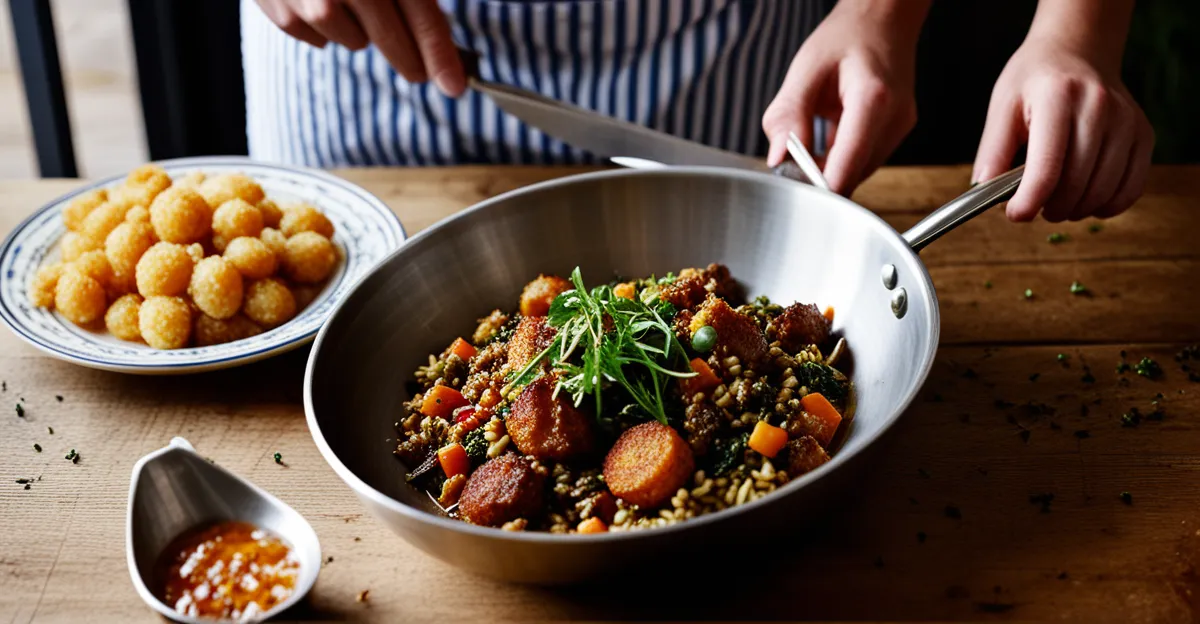Global Influences Shaping Contemporary British Cuisine
Globalization has profoundly transformed British food culture, infusing it with diverse flavors and techniques. The global influences on British cuisine have expanded dramatically, integrating international ingredients such as spices from Asia, herbs from the Mediterranean, and tropical fruits from the Caribbean. These additions have enriched traditional British culinary foundations, fostering a more vibrant and eclectic food scene.
Modern British recipes now routinely incorporate elements from other cuisines, reflecting the UK’s multicultural society. For example, common staples like roast dinners may feature exotic spice blends or sauces inspired by Middle Eastern or South Asian cooking styles. This blending is neither accidental nor superficial; it signifies an evolution of British culinary identity where authenticity involves innovation, not mere preservation.
Also to read : How can you prepare a classic beef Wellington at home?
In the 21st century, British cuisine has moved away from its historically insular character. Chefs and home cooks alike experiment with international ingredients, resulting in dishes that respect tradition while embracing a global palate. This change not only broadens flavor profiles but also challenges perceptions of what makes food distinctly British. Understanding the global influences on British cuisine helps explain why contemporary British cooking is dynamic, harmonious, and exciting to both locals and visitors.
Incorporation of International Flavors in Modern British Recipes
The fusion cuisine UK scene is a vibrant testament to the rich multicultural British cooking landscape. As global influences on British cuisine rise, dishes combining Asian, Middle Eastern, and Caribbean flavors have become staples. For example, a British curry might blend Indian spices with Caribbean heat or Middle Eastern herbs, creating unique taste profiles that embody international cuisine in Britain.
Also to see : How Can British Cuisine Become More Sustainable?
Multicultural communities play a crucial role in shaping British food trends by introducing authentic ingredients and cooking methods that seamlessly blend with local tastes. This active cultural exchange means dishes like jerk chicken, falafel wraps, or spicy ramen are no longer niche but mainstream in many UK eateries.
The integration of international ingredients such as lemongrass, sumac, and Scotch bonnet peppers reflects this culinary diversity. Together, they enable modern British recipes to offer exciting, fresh flavors while encouraging home cooks and chefs alike to explore fusion-based cooking. This dynamic interaction broadens palates and encourages innovation, reinforcing the idea that British cuisine continually adapts and thrives through global inspiration.
Reinvention of Traditional British Dishes
Modern British cuisine embraces British food innovation by reimagining traditional British dishes with a global twist. Classic recipes like shepherd’s pie or fish and chips are frequently adapted by incorporating international ingredients such as miso, harissa, or coconut milk, adding depth and freshness to familiar flavors. This approach reflects a broader trend of adapting classic recipes to suit evolving palates and dietary preferences.
For example, traditional roast dinners might replace standard potatoes with spiced sweet potato mash or introduce Mediterranean herbs to enrich the gravy. These reinventions not only honor the original dish’s essence but also highlight its versatility within a contemporary context.
Chef-driven innovations have propelled this culinary evolution further. Renowned British chefs often experiment with cross-cultural elements, showcasing how traditional British dishes modern twists can revitalize the national culinary identity. Their creativity encourages both professional kitchens and home cooks to explore new techniques and ingredient pairings.
In summary, the reinvention of British classics underscores a confident culinary culture willing to merge heritage with innovation, proving that tradition does not hinder but rather enriches modernization in British food. This ongoing dialogue between old and new is vital to today’s vibrant British food scene.
Expert Perspectives on Globalization in British Food
Leading voices in UK gastronomy emphasize that global influences on British cuisine have unlocked new creative possibilities while preserving the soul of traditional dishes. Renowned chefs often express that globalization encourages experimentation rather than dilution. For example, chef opinions globalization highlight how international ingredients offer fresh palettes to reimagine well-loved recipes without sacrificing heritage.
Food experts British cuisine similarly note the vital balance between honoring classic flavors and embracing innovation. They argue that this duality is fundamental to the ongoing evolution of the dining experience across the UK. Cultural exchange provides chefs with tools to adapt dishes sensitively and thoughtfully, maintaining authenticity while responding to contemporary tastes.
Regarding globalization’s long-term effects on British culinary practices, experts foresee an increasingly diverse food culture shaped by migration and global trade. They predict that UK gastronomy evolution will continue progressing through collaboration, knowledge sharing, and ingredient accessibility. This dynamic ensures British cuisine remains vibrant and relevant on the world stage.
In sum, food experts underscore that globalization enriches British cooking by fostering inclusivity and creativity. Their insights reveal that blending tradition with global influences produces a resilient culinary identity, capable of evolving while respecting its roots in modern British recipes and international ingredients.
Trends in British Restaurants and Home Cooking
The landscape of British restaurant trends in 2024 highlights a clear shift towards embracing global flavors. Many UK eateries now feature menus rich in fusion dishes, combining elements from Asian, Middle Eastern, and Caribbean cuisines. This movement caters to diners seeking diverse and innovative meals, blending familiar British fare with international twists.
In home kitchens, global flavors at home have become increasingly popular. Recipes incorporating spices like sumac, harissa, and lemongrass are routinely prepared by home cooks eager to experiment beyond traditional ingredients. This reflects a growing consumer appetite for adventurous cooking that respects both flavor and convenience.
Shifts in UK cooking trends 2024 further show that accessibility to international ingredients drives culinary creativity. Specialty markets and online retailers make these products broadly available, encouraging home cooking that mirrors restaurant innovation. The trend is also supported by cooking shows and social media, which introduce new techniques and fusion ideas to a wide audience.
Together, these factors demonstrate how British restaurant trends and home cooking are intertwined through global influences on British cuisine. Both spheres contribute to a dynamic food culture where experimenting with international ingredients fosters continuous evolution in British culinary practices.




